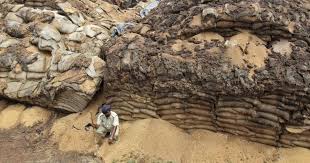In Madhya Pradesh, Insects In Wheat Bags, Lakhs Of Tonnes Allowed To Rot
By Anurah Dwary
Lakhs of tonnes of wheat in government warehouses across Madhya Pradesh have rotted and become infested with insects, causing immense financial and food security loss.
This has also raised questions about food storage practices in the central state.
The wastage was flagged after the Food Corporation of India refused to accept the wheat and called it unfit for consumption. In response the ruling BJP ordered a probe.
The big question, though, is – was this spoiled wheat was being prepared for distribution through the public ration system, potentially reaching the plates of the poor?
Four years ago – during the COVID lockdown – NDTV exposed how substandard rice – the quality was so poor it was deemed unfit even for livestock – was being distributed for free to the poor.
The NDTV report led to a major uproar and Prime Minister Narendra Modi’s office demanded a detailed report from the state. Now, four years later, little has changed.
Back then the state government – led by Chief Minister Shivraj Singh Chouhan – said it had taken action over quality of grain supplied to people in the Balaghat and Mandla tribal belts.
Mr Chouhan also ordered an investigation by the state’s Economic Offences Wing.
However, a recent inspection indicated 2,600 tonnes of wheat – bought between 2018 and 2021 from Jabalpur and stored in Ashoknagar – were of such poor quality it was compared to livestock feed.
This reflects a broader issue acknowledged by warehouse manager Uday Singh Chauhan, “The wheat arrived three months ago but quality has deteriorated.”
According to the FCI 10.64 lakh tonnes of wheat are now unfit for human consumption.
Of this 6.38 lakh tonnes can be salvaged but there will be a significant compromise in quality, the FCI has said. The rest has been completely written off.
| 2020 / 21 | 1.57 lakh metric tonnes |
| 2021 / 22 | 3.85 lakh metric tonnes |
| 2022 / 23 | 1.12 lakh metric tonnes |
| 2023 / 24 | 4.09 lakh metric tonnes |
What makes the problem even more acute is that the spoiled wheat wasn’t found at one or two warehouses, or in those in a certain area. It was found across facilities state-wide.
Food and Civil Supplies Minister Govind Singh Rajput, said, “We have received complaints… Whether the fault lies with officers or warehouse owners… I have written to the Principal Secretary for a strict and immediate investigation. Those responsible will face strict action.”
This development is particularly concerning given that 5.37 crore families in Madhya Pradesh rely on free food grains under the National Food Security Act. The potential distribution of unfit wheat to these vulnerable populations could have devastating consequences.
In February last year six men, including the branch manager of a silo bag storage company, were charged for mixing sand, concrete, and soil dust in government-procured wheat in Satna.
Around seven lakh quintal of wheat procured by the state from farmers over the last two years was stored at the concerned silo, of which three lakh was already transported for distribution to the poor.
This article has been republished from The NDTV.

